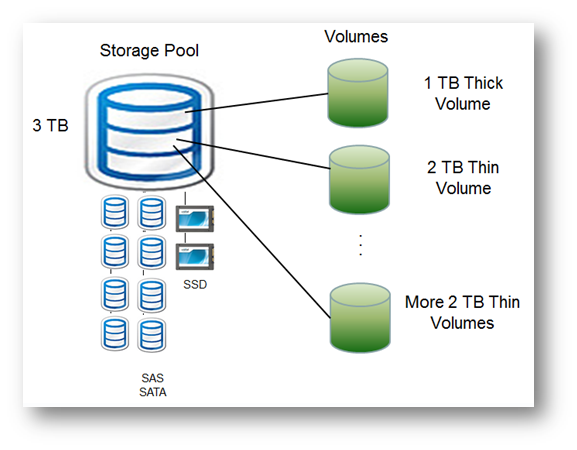Volumes provide a way to allocate storage available in a storage pool and share it over the network.
In the above example, the Storage Pool with 3 TB of disk space is allocated from several SAS, SATA and/or SSD devices. There are 3 volumes and like VMDK, a volume can be either thick-provisioned or thin-provisioned. The thick-provisioned volumes cause storage space to be reserved from the storage pool, reducing the amount of storage available for use by other volumes. The thin-provisioned volumes consume actual storage pool space when the data is written to the volume.
So, there is a thick-provisioned volume which reserves 1 TB of the available 3 TB storage pool and there are also 2 thin-provisioned volumes up to 2 TB of thin-provisioned storage space available to each of them.
Note: As each thin-provisioned volume grows with actual data written to the volume, the available storage pool space for all thin-provisioned volumes shrinks to the remaining unused storage pool space. Volumes allocate and organize storage, and are published for sharing on the network using either CIFS (Common Internet File System) or NFS (Network File System).
Configure filesystem volumes for sharing as CIFS Share or NFS Share so that storage is available for use by the applications, servers and clients on the network.
Configure block device volumes as LUNs (block data storage devices), for use with iSCSI targets.
Using Our Documentation
Buurst has organized its SoftNAS documentation according to task based and platform based documentation. This means you can find what you are looking for by simply selecting the subject you wish to know about, and drilling down to the appropriate location. Task based pages such as this one are organized into platforms, allowing you to narrow your focus to the content and platform relevant to you. Content that is common across platforms is listed in All Platforms, and content specific to, or primarily focused on a given platform is organized accordingly. We hope you find this format simple and easy to use. See the links below to begin your journey. Remember, if you don't find the subject matter you are looking for, check the All Platforms section.
